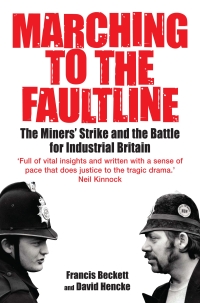Marching to the Fault Line
 Description:
Description:
The Miners' strike was a dividing line in Modern British history. Before 1984, Britain was an industrial nation, reborn from the ashes of the Second World War by Clement Atlee's vision of a welfare state. Most of the great industries were nationalised and the trade unions was one of the major forces in the land. After the strike, which ended in defeat, Thatcher's Britain was born. It is still an event that causes huge contoversy.
Marching to the Faultline tells the full story of the strike from confidential cabinet meetings at Downing Street to backroom negotiations, and life on the picket line. The book draws on previously unseen sources from interviews with the major figures, private archives and documents obtained under the FOI to set the record straight.
It conclusively reveals for the first time:
- That Thatcher's government had prepared for the strike in advance,
- The strike was started by a misunderstanding: that Cortonwood pit was to close; it wasn't.
- That there would have been widespread support if a ballot had been taken
- The Battle of Orgreave was a decoy planned to draw the miners away from Nottinghamshire
- Scargill personally blocked a number of deals, including one involving his own deputy Mick McGahey
Reviews:
A revealing new book by two respected journalists – Daily Mail.
Restores Labour’s greatest defeat to history, not myth – New Statesman.
The first attempt since its immediate aftermath to offer a full account of the strike itself – Seumas Milne, Guardian.
This explosive book... Good Book Guide
The miners’ strike was the pivot on which Britain turned from post-war settlement to Thatcherism. Yet until now it has gone without a comprehensive history. Jon Swaine, Daily Telegraph.
I thought there wasn’t much new to be said about the strike. I was wrong. Francis Beckett and David Hencke found rich new seams of material. Paul Routledge, The Tablet.
A weapon in the ideological war against trade unionism... To anyone thinking of buying this book, only remember this. Don't feed the jackals. Andrew Murray, Morning Star.
A lively, popular and informed account of the strike -- BBC History Magazine
The first attempt since its immediate aftermath to offer a full account of the strike itself. . . . [breaks] some useful new ground by exploiting the Freedom of Information Act and winkled out cabinet papers and Coal Board minutes to throw light on behind-the-scenes government manoeuvring. -- The Guardian
An accurate historical account of the political significance of [the NUM s] struggle ... It demonstrates in fine detail how a political party can wreak vengeance on a large important workforce from villages and small communities and their families - Ian Gibson MP, Total Politics magazine 'Well researched, full of vital insights and written with a sense of pace that does justice to the tragic drama. -- Neil Kinnock
Meticulously researched . . the roles of Thatcher and Scargill and the striking miners themselves are questioned in a deeper way than ever before, and a secret history of espionage and dirty tricks is revealed. -- Waterstone's Books Quarterly
Only the dogmatic partisans of Margaret Thatcher or Arthur Scargill will find serious fault with [this] account of the bitterly divided struggle. -- Times Literary Supplement
Product Details:
- Hardcover: 420 pages
- Publisher: Constable; First Edition edition (26 Feb 2009)
- ISBN-10: 1845296141
- ISBN-13: 978-1845296148
- Dimensions: 23.4 x 16.2 x 3.4 cm
